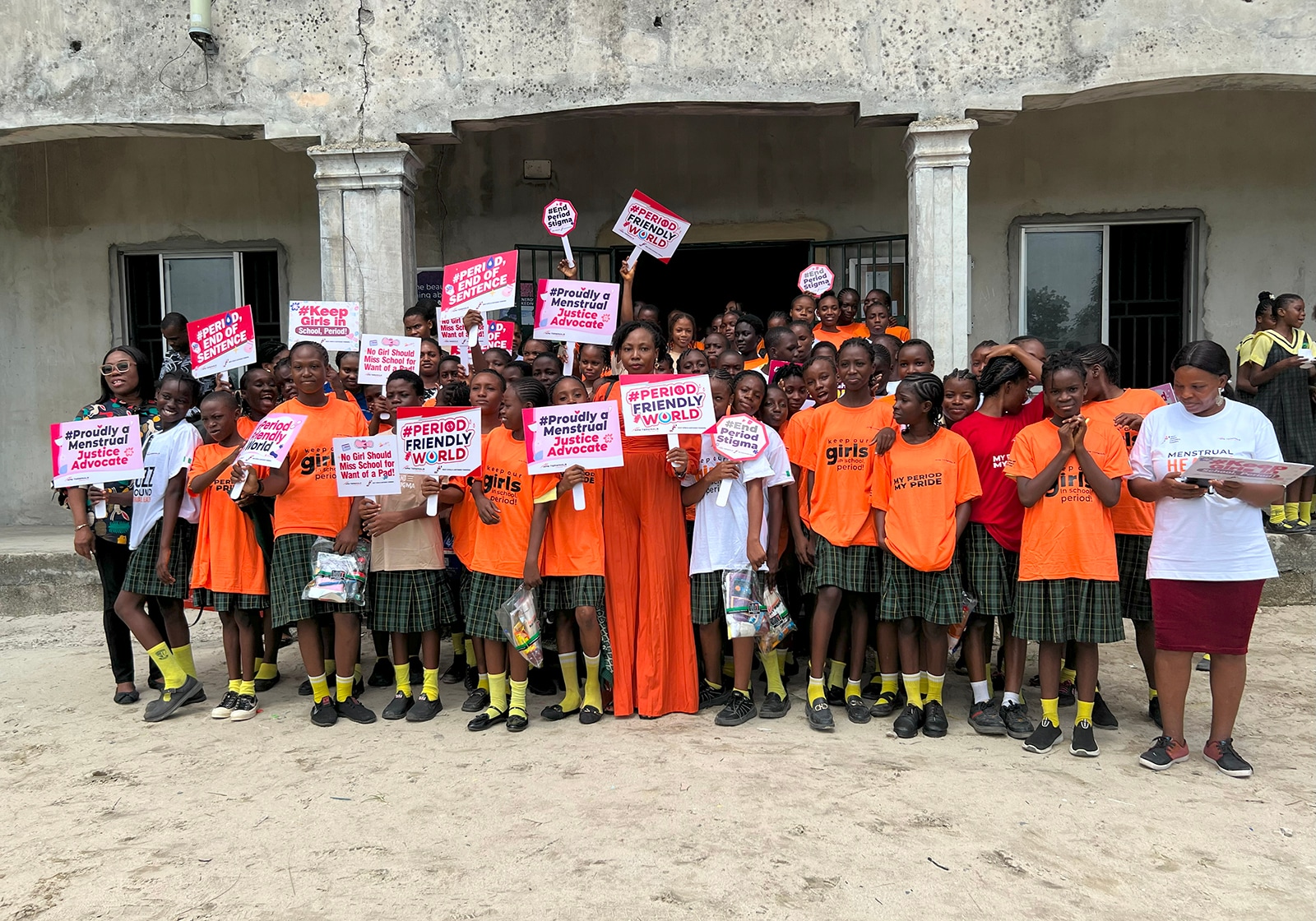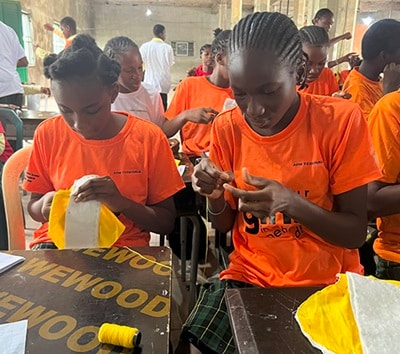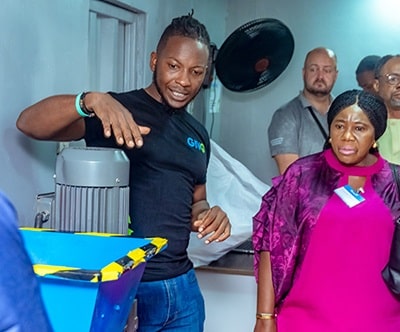
30/07/25
Impact through recycling: Two community initiatives at our Nigeria terminals
At APM Terminals Apapa in Lagos and WACT-APM Terminals in Onne, two impactful initiatives are helping reduce waste and build resilience.
In Onne, girls are learning to produce reusable sanitary pads, promoting menstrual hygiene and cutting plastic waste.
In Lagos, a new solar-powered recycling hub is converting plastic waste into reusable materials, supporting jobs and reducing carbon emissions. Both programmes demonstrate how local solutions can drive long-term environmental and social benefits.
Menstrual health training programme

What began as a modest training session in two schools has grown into a movement reshaping how girls and communities in Nigeria's Rivers State think about menstruation, hygiene and sustainability.
In early 2022, during community needs assessments and focus group discussions in the host communities of Onne and Ogu, in Rivers State, a recurring issue emerged: many girls lacked consistent access to sanitary pads. Teachers reported regular requests for donated supplies, and girls openly discussed the stigma and hardship associated with menstruation. Rather than respond with a one-time donation, WACT-APM Terminals Nigeria took a different approach – empowering through skills training.
“We don’t believe in giving people fish; we believe in teaching them how to fish,” said Community Relations Manager, Justin Okwuofu. With this philosophy in mind, WACT partnered with Dufy Global Enterprise and the Centre for Creative Development Strategies to launch a sanitary pad recycling and production programme that trains students to make their own reusable pads.
The programme began in February 2024, training 100 students in two schools. The impact was immediate. “During the first session, other students were peeking through the windows with such interest,” said Okwuofu. “By March, we expanded to more students before the school break”.
The real proof came after schools resumed. A principal called to report that fewer girls were visiting her office for sanitary pads. Many had begun making their own, and even preferred them. Word quickly spread, and schools beyond the host communities began requesting the training. By June 2025, more than 1,800 students - girls, boys, women and men - had been trained across 22 schools.
The initiative is helping to dismantle the stigma surrounding menstruation, reduce school absenteeism, and introduce basic entrepreneurial skills. It’s also addressing a long-overlooked environmental issue. Disposable pads are made with plastic and synthetic fibres that can take up to 800 years to decompose. One woman may use as many as 15,000 pads in her lifetime, most ending up in landfills or waterways.
Reusable pads, made from locally sourced cotton, microfiber, leak-proof fabric, and sewn with simple hand tools, offer a far more sustainable and affordable alternative.
One of the most touching signs of success came when a teacher learned about the programme from her own daughter, who had attended a training in a nearby school and passed the skill along.
Employee engagement has also been strong, with staff participating in sessions and championing the cause internally. From stigma to self-sufficiency, this initiative is proof that lasting impact starts with listening, acting locally and teaching practical, life-changing skills.
Zero-carbon recycling hub in Lagos

In a major step toward tackling plastic pollution and fostering circular economy practices, APM Terminals Apapa partnered with Nigerian waste management startup Garbage In Value Out (GIVO) to launch a Zero Carbon Recycling Hub in Apapa, Lagos.
The initiative marks a significant milestone on the company’s broader corporate social responsibility (CSR) agenda, with environmental sustainability identified as one of its three key focus areas, alongside education and healthcare. The launch event, hosted at Ladi-Lak Primary School in Apapa, underscored a shared commitment to both community development and climate action.
Strategically located to serve a 25-kilometre radius, the new recycling hub is designed to make waste recycling more accessible to residents while promoting long-term behavioural change around plastic use and disposal. Powered entirely by solar energy, the facility is capable of recycling around 300 kilograms of waste per day - a total of about 90 metric tons annually. In doing so, it helps avoid up to 3,000 metric tons of carbon dioxide emissions each year, contributing meaningfully to Nigeria’s climate goals.
This partnership builds on APM Terminals Apapa’s growing portfolio of environmental initiatives. Previous efforts have included the upcycling of used tyres into practical goods such as floor mats and footwear. More recently, the company began sourcing employee workwear made from recycled plastic waste.
The collaboration with GIVO also introduces a clear social impact component. By paying people per kilogram of plastic waste collected, the programme creates financial incentives for community members while also generating jobs. To date, the project has resulted in more than 15 direct jobs and more than 50 indirect jobs.
By processing waste materials on-site, the project reduces the need for long-distance transport of recyclables, further cutting emissions. The initiative also aims to raise awareness of the environmental hazards caused by single-use plastics, such as clogging drainage systems, contributing to flooding and polluting nearby waterways.
Several key stakeholders, including LASEPA, NIMASA and the Lagos Port Complex Apapa, have endorsed the project, recognizing its potential to support cleaner communities, healthier marine environments and more resilient urban infrastructure.
Importantly, the initiative aligns with APM Terminals’ global goal to achieve net-zero emissions by 2040. By localising environmental action and empowering communities to take part, the project illustrates what sustainable development can look like when industry and innovation come together at the grassroots level.
As Lagos and other urban hubs continue to grapple with the twin challenges of waste and emissions, the Zero Carbon Recycling Hub offers a hopeful, replicable model - one where environmental stewardship, economic inclusion and community partnership converge to drive real impact.